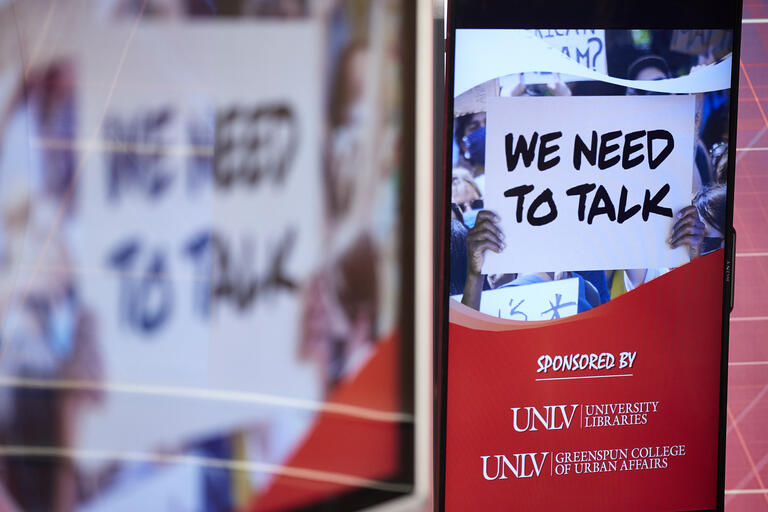The work, lives, and influence of 20th-century writers that included Walker Percy and Albert Camus, widely acclaimed for novels that opened unique windows into the human soul and its challenges, became centerpieces of recent talks given through the Kirk Kerkorian School of Medicine at UNLV by the Alpha Omega Alpha Medical Honor Society Speaker Series.
So did the legacy of the late John Wooden, who led the UCLA Bruins to 10 NCAA men's basketball championships. These disparate influences were brought together in three talks Oct. 5 by Dr. Richard Gunderman, the Indiana University professor of medicine, liberal arts, and philanthropy who’s authored 15 books.
Dr. Gary Shen, the school's assistant dean for clinical education who serves as adviser to the school’s AOA chapter, said bringing Gunderman to the school gave "our students a voice from another perspective.”
Gunderman, who’s become best known nationally for his frequent articles on medicine for The Atlantic, champions the idea that doctors can be more effective in patient care if they value human perspectives coming from outside medical-driven data and textbooks.
He said Camus’ 1947 novel The Plague, a book about an epidemic in the large Algerian city of Oran, offers lessons to be learned for the COVID pandemic and beyond. Camus lets us know, he said, that the lessons of plagues and pandemics shouldn't be confined to protocols and supplies. That instead we must learn in our daily lives to express care and concern for others, as Dr. Rieux, the novel’s hero, does.
Fourth-year medical student Amalie Alver, who attended all three of Gunderman’s lectures, says his talk regarding the COVID pandemic, where he noted loneliness had affected the emotional well-being of many Americans, reminded her of how important it is to reach out to others. Researchers, she recalled, found out even before the pandemic that loneliness and isolation are as bad as smoking 15 cigarettes a day.
Gunderman has been heartened to see many Americans reaching out to others during the COVID pandemic. “What he had to say reminded me that I need to take the time to reach out to others,” Alver said. “It really does make a difference in people’s lives.”
The writer Walker Percy, who received his medical degree in 1941, made it clear in his work — he won the National Book Award for The Moviegoer in 1962 — that he realized that there was more to “sickness and health, life and death, than what was found in medical textbooks.”
In his last talk at the medical school, Gunderman suggested that students might want to adapt some principles to live by, much as Wooden did. The coach was fond of saying that when he graduated from the eighth grade his father shared a seven-point creed to live by that he strove to follow for the rest of his life. It included principles such as being true to yourself, helping others, and drinking deeply from good books.
“In medicine, we always have a to-do list for our patients,” Shen said. “Patient A needs this and Patient A needs that. In our busy lives, it isn’t a bad idea to have a framework to live by for our lives, to help us develop as a person.”



